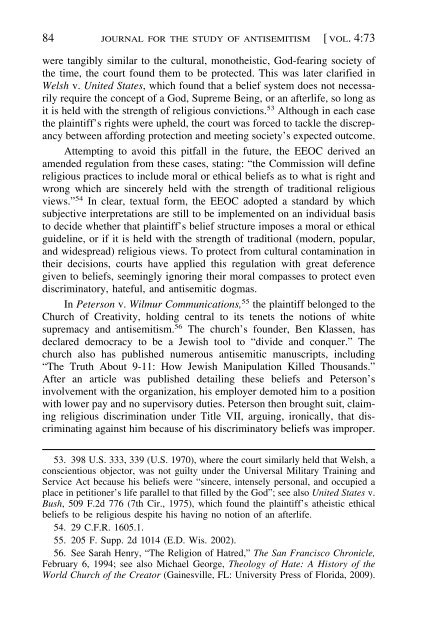Volume 4 No 1 - Journal for the Study of Antisemitism
Volume 4 No 1 - Journal for the Study of Antisemitism
Volume 4 No 1 - Journal for the Study of Antisemitism
You also want an ePaper? Increase the reach of your titles
YUMPU automatically turns print PDFs into web optimized ePapers that Google loves.
84 JOURNAL FOR THE STUDY OF ANTISEMITISM [ VOL. 4:73<br />
were tangibly similar to <strong>the</strong> cultural, mono<strong>the</strong>istic, God-fearing society <strong>of</strong><br />
<strong>the</strong> time, <strong>the</strong> court found <strong>the</strong>m to be protected. This was later clarified in<br />
Welsh v. United States, which found that a belief system does not necessarily<br />
require <strong>the</strong> concept <strong>of</strong> a God, Supreme Being, or an afterlife, so long as<br />
it is held with <strong>the</strong> strength <strong>of</strong> religious convictions. 53 Although in each case<br />
<strong>the</strong> plaintiff’s rights were upheld, <strong>the</strong> court was <strong>for</strong>ced to tackle <strong>the</strong> discrepancy<br />
between af<strong>for</strong>ding protection and meeting society’s expected outcome.<br />
Attempting to avoid this pitfall in <strong>the</strong> future, <strong>the</strong> EEOC derived an<br />
amended regulation from <strong>the</strong>se cases, stating: “<strong>the</strong> Commission will define<br />
religious practices to include moral or ethical beliefs as to what is right and<br />
wrong which are sincerely held with <strong>the</strong> strength <strong>of</strong> traditional religious<br />
views.” 54 In clear, textual <strong>for</strong>m, <strong>the</strong> EEOC adopted a standard by which<br />
subjective interpretations are still to be implemented on an individual basis<br />
to decide whe<strong>the</strong>r that plaintiff’s belief structure imposes a moral or ethical<br />
guideline, or if it is held with <strong>the</strong> strength <strong>of</strong> traditional (modern, popular,<br />
and widespread) religious views. To protect from cultural contamination in<br />
<strong>the</strong>ir decisions, courts have applied this regulation with great deference<br />
given to beliefs, seemingly ignoring <strong>the</strong>ir moral compasses to protect even<br />
discriminatory, hateful, and antisemitic dogmas.<br />
In Peterson v. Wilmur Communications, 55 <strong>the</strong> plaintiff belonged to <strong>the</strong><br />
Church <strong>of</strong> Creativity, holding central to its tenets <strong>the</strong> notions <strong>of</strong> white<br />
supremacy and antisemitism. 56 The church’s founder, Ben Klassen, has<br />
declared democracy to be a Jewish tool to “divide and conquer.” The<br />
church also has published numerous antisemitic manuscripts, including<br />
“The Truth About 9-11: How Jewish Manipulation Killed Thousands.”<br />
After an article was published detailing <strong>the</strong>se beliefs and Peterson’s<br />
involvement with <strong>the</strong> organization, his employer demoted him to a position<br />
with lower pay and no supervisory duties. Peterson <strong>the</strong>n brought suit, claiming<br />
religious discrimination under Title VII, arguing, ironically, that discriminating<br />
against him because <strong>of</strong> his discriminatory beliefs was improper.<br />
53. 398 U.S. 333, 339 (U.S. 1970), where <strong>the</strong> court similarly held that Welsh, a<br />
conscientious objector, was not guilty under <strong>the</strong> Universal Military Training and<br />
Service Act because his beliefs were “sincere, intensely personal, and occupied a<br />
place in petitioner’s life parallel to that filled by <strong>the</strong> God”; see also United States v.<br />
Bush, 509 F.2d 776 (7th Cir., 1975), which found <strong>the</strong> plaintiff’s a<strong>the</strong>istic ethical<br />
beliefs to be religious despite his having no notion <strong>of</strong> an afterlife.<br />
54. 29 C.F.R. 1605.1.<br />
55. 205 F. Supp. 2d 1014 (E.D. Wis. 2002).<br />
56. See Sarah Henry, “The Religion <strong>of</strong> Hatred,” The San Francisco Chronicle,<br />
February 6, 1994; see also Michael George, Theology <strong>of</strong> Hate: A History <strong>of</strong> <strong>the</strong><br />
World Church <strong>of</strong> <strong>the</strong> Creator (Gainesville, FL: University Press <strong>of</strong> Florida, 2009).














